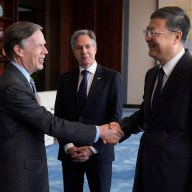By Devika Krishna Kumar
NEW YORK (Reuters) – Oil prices fell in volatile trade on Wednesday, weighed down by equity markets as China signaled readiness to escalate the trade war with the United States, stoking concerns that an ongoing stand-off could hurt demand.
Supply constraints linked to the Organization of the Petroleum Exporting Countries’ output cuts and political tensions in the Middle East offered some support, however.
Brent crude futures, the international benchmark for oil prices, ended the session at $69.45 a barrel, down 66 cents, or 0.9%, having hit a session low of $68.08.
U.S. West Texas Intermediate (WTI) crude futures fell 33 cents, or 0.6%, to settle at $58.81 per barrel, after hitting a low of $56.88, the lowest since March 12.
Both contracts were set for a monthly decline.
In the United States, cash crude markets in Cushing, Oklahoma and fuel markets in the area have been roiled this week by pipeline outages and disruptions due to flooding in the Midwest after heavy rains.
But U.S. crude futures and the front-month spread between July and August U.S. crude futures pared some losses in part due to news of the Ozark pipeline from Cushing to Illinois restarting on Thursday, traders and brokers said.
Trading in the front-month spread is closely tied to supply and demand at Cushing, the delivery point for U.S. crude futures.
In a sign of escalating tensions between the world’s two biggest economies, China signaled it was ready to use its dominant position in rare earths to strike back in a trade war with the United States, Chinese newspapers warned on Wednesday.
Rare earths are a group of 17 chemical elements used in products ranging from high-tech consumer electronics to military equipment.
Trade worries and slowdown fears have pressured investors to dump so-called “risk assets” such as equities and oil globally and seek safety in German and U.S. government debt. Wall Street’s main indexes hit more than two-month lows on Wednesday.
While China has so far not explicitly said it would restrict rare earths sales to the United States, Chinese media have strongly implied this would happen.
Meanwhile, U.S. crude oil inventories were forecast to have drawn down last week, after climbing to the highest levels since July 2017 a week earlier due to near-record high production and lower refinery runs in the Midwest.
Weekly U.S. oil inventory data has been delayed by Monday’s Memorial Day holiday, with industry data due later on Wednesday and the government’s report on Thursday at 11 a.m. EDT.
TIGHTER GLOBAL SUPPLIES
Despite these concerns dragging on oil markets, crude prices remain supported on overall supply tightness.
Iranian May crude exports fell to less than half of April levels to around 400,000 barrels per day (bpd), tanker data showed and two industry sources said, after the United States tightened the screws on Tehran’s main source of income.
July Brent crude futures were trading at around $1.50 a barrel above the August contract, a structure known as backwardation, which points to a tight market.
“The last time it was any higher in this segment was in September 2013,” Commerzbank said. “That market participants are prepared to pay such a premium for oil that can be delivered at short notice points to tight oil supply.”
Adding to the support are hopes that supply cuts led by OPEC and its allies, known as OPEC+, implemented at the start of the year to prop up the market, would be extended in a meeting next month.
Russia will carefully consider extending its oil output reduction agreement with OPEC+, Russian First Deputy Prime Minister Anton Siluanov told Reuters on Wednesday.
“OPEC and its allies are due to meet in June or July to discuss the output policy, with the likelihood resulting in an extension to the current cutting policy which has been in place throughout 2019,” said Mihir Kapadia, chief executive of Sun Global Investments.
“We expect markets to remain underwhelming until the meeting has taken place as investors look to avoid taking risks until the picture is much clearer.”
(Additional reporting by Ahmad Ghaddar in London, Henning Gloystein in Singapore; Editing by Richard Chang and Lisa Shumaker)



















